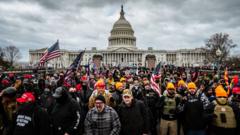Matthew Huttle, an Indiana man pardoned by President Trump for his role in the January 6 Capitol riot, was killed by police during a traffic stop. The incident raises questions about the implications of the pardons granted to those involved in the riot, as others face legal troubles after being released.
Indiana Man Killed by Police Days After Trump Pardoned Him for Capitol Riot

Indiana Man Killed by Police Days After Trump Pardoned Him for Capitol Riot
Matthew Huttle, recently pardoned for his involvement in the January 6 Capitol riot, was shot dead by police following a traffic stop where he reportedly resisted arrest.
An Indiana man, Matthew Huttle, 42, was fatally shot by police just days after being pardoned by former President Donald Trump for his participation in the January 6 Capitol riot. The incident occurred during a traffic stop this past Sunday when Indiana State Police (ISP) stated that Huttle allegedly resisted, resulting in an "altercation" with an officer. The precise reason for the traffic stop and the nature of the alleged resistance remain unclear, but reports indicated that Huttle was in possession of a firearm at the time.
Huttle was among nearly 1,600 individuals who received pardons from Trump following their involvement in the violent events at the Capitol on January 6, 2021. Trump supporters had stormed the government building in an effort to overturn the election results. Huttle, having spent approximately ten minutes inside the Capitol, was sentenced to six months in prison as part of a plea agreement but was released in July 2024.
The officer who shot Huttle is currently on paid administrative leave as the investigation into the incident unfolds. Jasper County Sheriff Patrick Williamson has requested a thorough investigation by the Indiana State Police to ensure transparency.
This event is not isolated; another Capitol rioter, Daniel Bell from Florida, was recently rearrested on federal gun charges after being pardoned. Both Huttle and Bell are among those whose charges were dismissed by Trump during his initial return to the White House.
Trump has previously stated that the treatment of those involved in the Capitol riot was outrageous, sparking debate over the appropriateness of the pardons. Critics, including Senator Lindsey Graham, a Republican from South Carolina, have labeled the pardons as a "mistake," especially in cases involving violence against law enforcement officers during the insurrection. As the complexities surrounding these pardons emerge, the actions of those previously involved in the riot remain in the spotlight, with some vowing retribution while others face new legal challenges.























